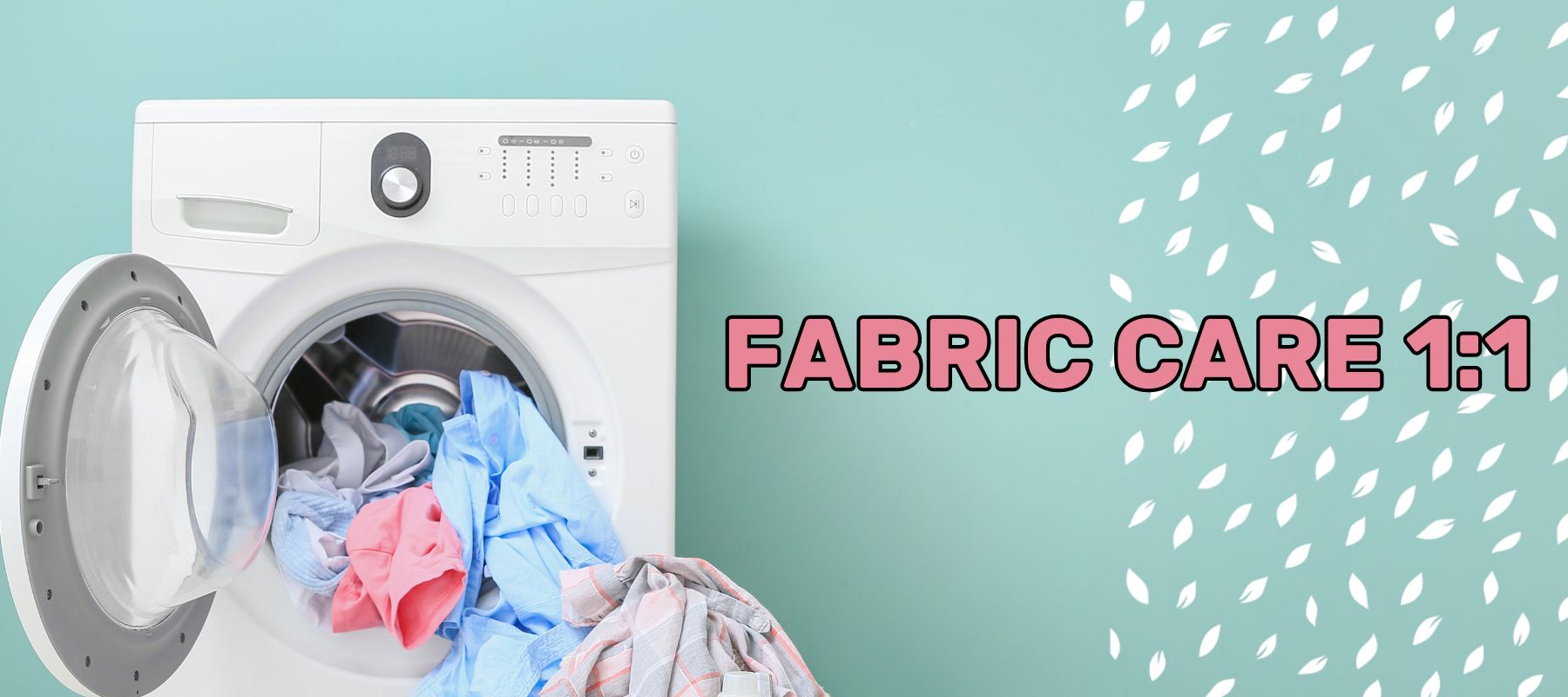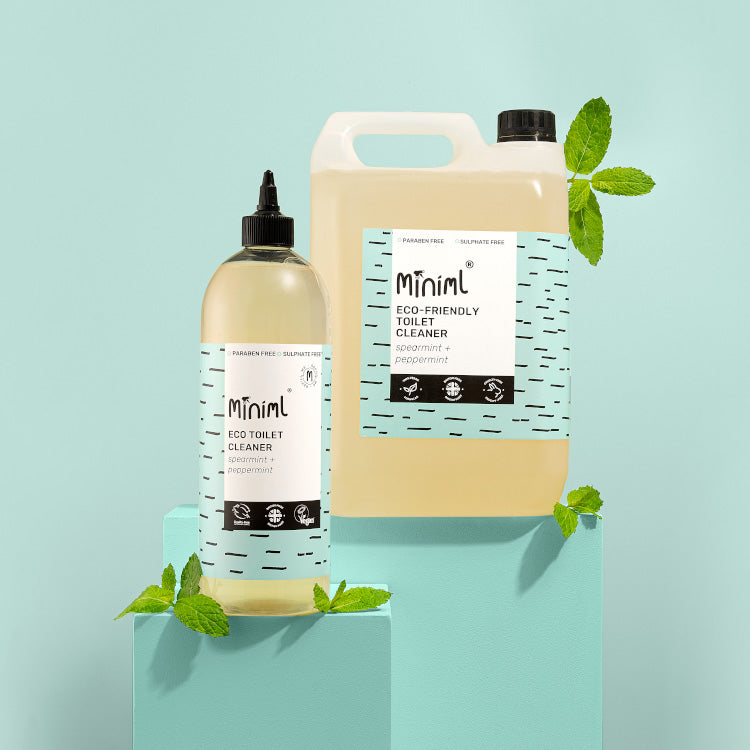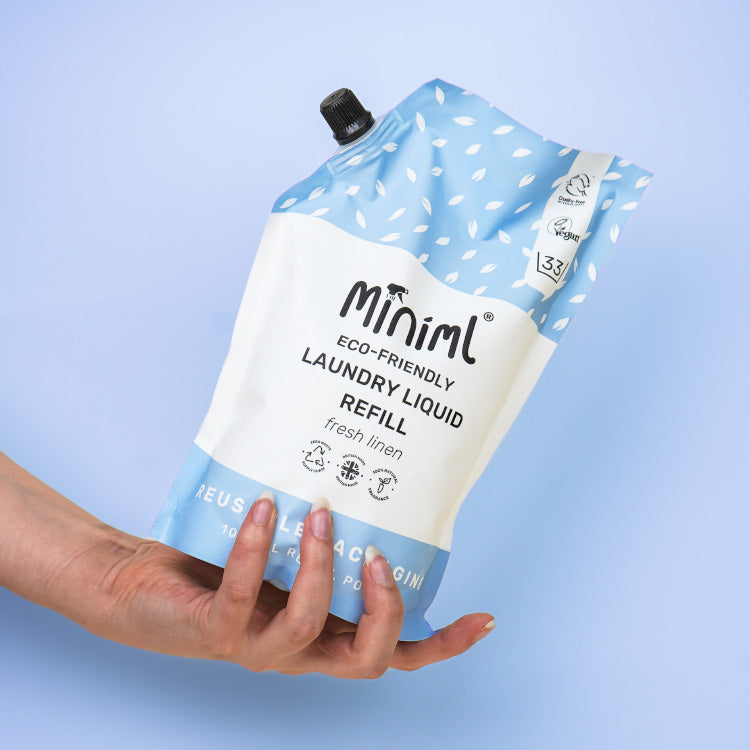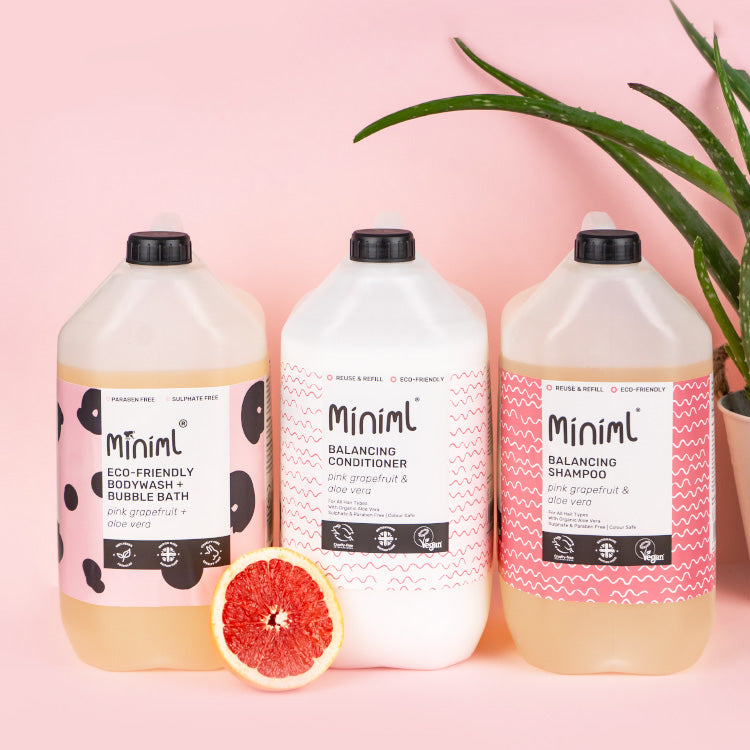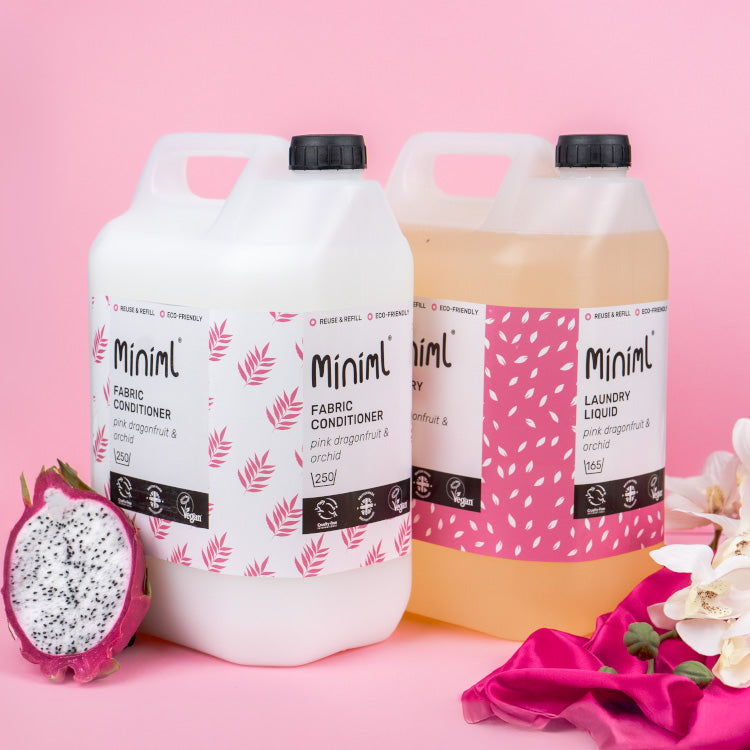
Maintaining the quality and longevity of your clothes starts with understanding the best way to care for different types of fabrics. Each fabric requires specific care to keep it looking its best. Here’s a straightforward guide to washing and looking after a variety of fabrics!
Cotton: The Everyday Essential

Cotton is durable and versatile, commonly used in T-shirts and bed linens. It’s easy to care for but benefits from a few specific steps:
- Washing: Machine wash in warm water with Miniml’s gentle, plant-based laundry detergent. Avoid hot water to prevent shrinking.
- Drying: Air dry if possible. If using a dryer, choose a low heat setting. High heat can cause cotton to shrink and lose its shape. A fun tip: add a few wool dryer balls to the mix – they help reduce drying time and wrinkles naturally.
- Ironing: Iron while slightly damp or use a steam iron. This helps smooth out wrinkles without damaging the fabric. For a crisp finish, try adding a little vinegar to your ironing water – it works wonders on stubborn creases!
Wool: Keeping You Warm, Naturally!

Although wool is natural and thick, it’s also very delicate. Proper care keeps it soft and cosy:
- Washing: Hand wash in cold water with a non-bio detergent to preserve the fibres. For machine washing, use a gentle cycle with cold water. Wool has a natural elasticity that helps it keep its shape, so treat it gently to maintain this feature.
- Drying: Lay flat on a towel to dry to maintain its shape. Rolling wool garments in a towel to remove excess water before drying flat can help speed up the process. Fun fact: wool can absorb up to 30% of its weight in moisture without feeling wet, making it a great choice for cooler climates!
- Storage: Store folded in a cool, dry place to prevent moth damage. Use cedar blocks or lavender sachets to deter moths naturally. Wool’s natural resilience makes it bounce back, so folding it properly can keep it looking new for years.
Silk: Luxury Treatment for Luxury Garments

Silk is luxurious and delicate. Special care is needed to keep it looking beautiful:
- Washing: Hand wash in cold water with a non-bio detergent to avoid thinning/wearing out fibres. Avoid wringing out the fabric to prevent damage or ripping a hole. No suprise, silk was once so valued and rare that it was used as currency!
- Drying: Lay flat on a clean towel away from direct sunlight to prevent fading. Gently press out excess water by rolling the fabric in a towel.
Did you know? Silk is naturally hypoallergenic and resistant to dust mites, making it a great choice for those with allergies.
3. Ironing: Use a low-heat setting with a cloth between the iron and the fabric. Avoid direct contact with high heat to prevent scorching or burning. For an extra touch of luxury, lightly spray the silk with water before ironing for a smoother finish.
Linen: The Summer Staple

Linen is breathable and perfect for warm weather, though it wrinkles easily. It has been used for over 4,000 years, so its best care tips are well known around the world !
Proper care is essential:
- Washing: Machine wash in cold or warm water. Avoid bleach, which can weaken the fibres and damage the fabric.
- Drying: Air dry or use a low heat setting in the dryer. Remove promptly to minimise wrinkles. Linen tends to dry quickly and air drying helps maintain its crisp texture.
A tip: linen gets softer with each wash, so embrace the wrinkles for a lived-in look.
3.Ironing: Iron while damp or use a steam iron on medium to high heat. This helps smooth out the wrinkles that are common with linen. To keep linen looking fresh, store it rolled instead of folded to prevent deep creases.
Synthetic Fabrics: Keeping Your Activities Comfy

Synthetic fabrics like polyester, nylon, and spandex are durable and used in activewear and everyday clothing. Although it’s made form a type of plastic, synthetic fabrics are great at absorbing sweat to keep you dry while exercising or taking part in your daily activities.
- Washing: Machine wash in cold water with Miniml’s detergent to prevent fabric breakdown and colour fading. Cold water helps maintain the integrity of synthetic fibres.
- Drying: Air dry or use a low heat setting. Avoid high heat to prevent loss of shape and elasticity. Synthetic fabrics dry quickly, so air drying is often sufficient.
- Ironing: Typically not required, but if necessary, use a low heat setting. High heat can melt or warp synthetic fibres. If you need to iron, use a pressing cloth to protect the fabric.
Denim: The Timeless Classic

Did you know? The indigo dye used in denim doesn’t fully penetrate the fabric, which is why jeans fade over time.Denim is durable but requires proper care to maintain its colour and shape.
- Washing: Turn jeans inside out and machine wash in cold water with Miniml’s detergent. This helps preserve the colour and prevent fading.
- Drying: Air dry to prevent shrinking and maintain fabric integrity. If using a dryer, select a low heat setting. Pro tip: to keep your jeans in top shape, wash them less frequently and spot clean as needed.
- Ironing: Usually not needed, but if required, use medium to high heat. Ironing inside out can help avoid shiny marks on the fabric. For a classic look, hang your jeans to dry to maintain their shape and fit.
General Care Tips Across All Fabrics:
- Stain Removal: You don’t need bleach or optical brighteners to remove stains! Head to our blog on how to remove stains with eco-friendly solutions to discover how to battle various marks while keeping your fabrics and the environment healthy.
- Eco-Friendly Practices: Use cold water cycles to save energy and reduce fabric wear. Miniml’s concentrated formulas ensure you use just the right amount, minimising waste.
Did you know? Washing clothes in cold water can save up to 90% of the energy used in a wash cycle.
- Proper Loading: Using a full load can help you save on bills, however, avoid overloading the washing machine to allow clothes to move freely and get thoroughly cleaned. This helps ensure even cleaning and reduces wear and tear on fabrics.
Why Choose Miniml for Fabric Care?
Miniml’s range of eco-friendly, non-toxic laundry products are designed to be gentle on fabrics while effectively removing dirt and stains. Free from harsh chemicals, they ensure your clothes are cared for without harming the environment. Plus, Miniml’s commitment to sustainability means you’re making a positive choice for the planet with every wash.
Understanding the specific needs of different fabrics and using Miniml’s eco-friendly products helps keep your clothes looking great and lasting longer. By incorporating these tips into your laundry routine, you can enjoy cleaner, fresher clothes while being kind to the environment.


